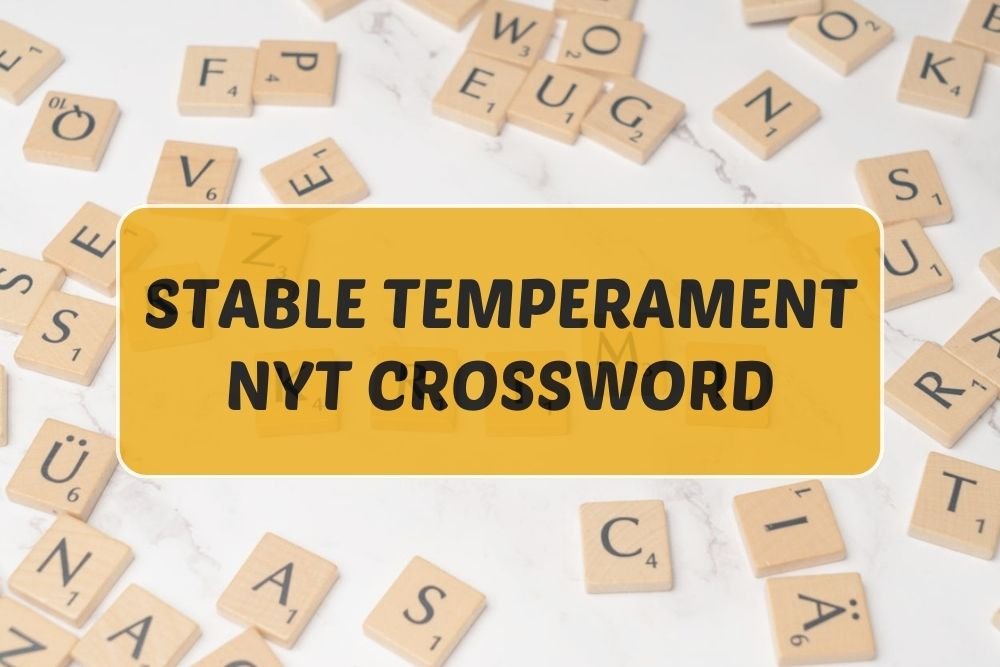When you encounter the clue “Stable Temperament,” it’s essential to break it down into its components:
- “Stable”: The word has two primary meanings—one refers to something steady or unchanging, and the other refers to a place where horses are kept. This double meaning is where the trick lies.
- “Temperament”: This typically refers to someone’s personality or disposition, often relating to how calm or volatile they are.
In crosswords, clues often play on these double meanings, so in this case, “Stable Temperament” could refer to a calm, steady personality or could hint at something related to horses.
Common Answers for “Stable Temperament”
To solve this clue, consider answers that could either refer to a steady personality or something horse-related. Here are a few common answers:
- EQUABLE: A word that means calm, even-tempered, or unchanging. It perfectly matches the idea of a “stable” temperament in terms of personality.
- PLACID: Another word for calm or peaceful, often used to describe someone’s steady temperament.
- DOCILE: Often used to describe animals, especially horses, this word can also fit the idea of a calm and controlled temperament. It aligns with the “stable” part of the clue, giving a nod to both meanings.
Strategies for Solving “Stable Temperament” Clues
If you’re struggling with “Stable Temperament,” here are some tips to help you get unstuck:
- Pay Attention to the Length of the Answer
The length of the word you’re trying to fill in will give you a big hint about which word fits. For example, EQUABLE and PLACID are shorter answers, while DOCILE can also be a great fit depending on the crossword grid. - Think About the Theme of the Puzzle
If the crossword puzzle has a theme related to animals, farms, or nature, there’s a good chance that “stable” could be referring to a horse’s stable. If the theme is more abstract or deals with human traits, you’re likely looking for a personality-related word. - Check the Crossings
Just like with other tricky clues, checking the letters you already have from intersecting answers is crucial. If you’ve already filled in parts of “walked for a cause nyt crossword” or “prey for a moray eel nyt crossword”, use those letters to guide your decision. - Consider Both Meanings
NYT Crossword clues often use wordplay. In this case, both definitions of “stable” could be in play, so think creatively about words that fit either interpretation.
Real Examples from NYT Crosswords
To give you a better sense of how “Stable Temperament” clues work in practice, let’s look at some real-world examples:
- In one puzzle, the clue “Stable Temperament” led to the answer PLACID. This fit because it refers to a calm, peaceful personality, aligning with the idea of being steady or stable.
- In another instance, DOCILE was the correct answer. Here, the clue played on the idea of a horse with a calm temperament, fitting with the secondary meaning of “stable.”
These examples show how understanding both the literal and figurative meanings of the clue can help you solve it faster.
Similar Clues to Watch For
NYT Crosswords are known for using similar clues that rely on wordplay and double meanings. Keep an eye out for clues like “walked for a cause nyt crossword“ or “prey for a moray eel nyt crossword,” which, like “Stable Temperament,” also play on common expressions or require specific knowledge.
Conclusion
Solving clues like “Stable Temperament” in the NYT Crossword requires a mix of knowledge, creativity, and a bit of wordplay. By considering both the figurative and literal meanings of words, and using intersecting answers to guide you, you can confidently solve even the trickiest clues. Keep practicing, and soon you’ll find that solving such puzzles becomes easier and more





